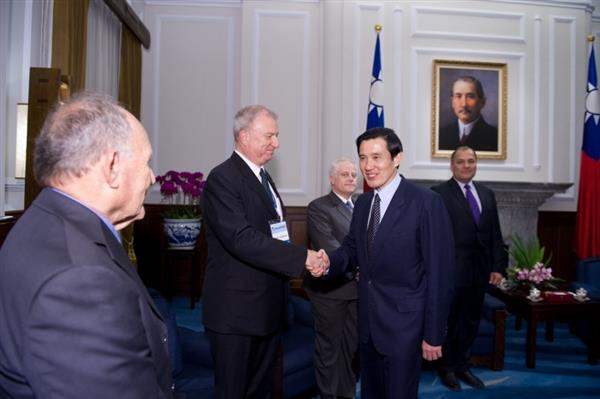News & activities
 News releases
News releases
President Ma Ying-jeou met on the afternoon of April 14 at the Presidential Office with foreign scholars and experts from the United States, Japan, Korea, Belgium, and Israel who were in Taipei for the 2011 International Conference on Homeland Security. The president extended a warm welcome to the visitors, and expressed his desire for even stronger cooperation and interaction in this area in the future.
President Ma remarked that countries today face an array of non-traditional security issues. He pointed out that the multi-pronged disaster in Japan in March, comprising an earthquake, tsunami, flooding, and nuclear power accident, is being closely watched by the international community, which has sought to formulate strategies in response. Prevention of and response to multi-pronged disasters are different in each case, he said, citing the example of typhoons and tsunamis. With typhoons, the government normally advises fishing vessels to take shelter in harbors. In a tsunami, however, boats in harbors could be washed ashore, so the government would instead recommend that vessels sail out to deep water. The president stated that since Taiwan sees frequent typhoons, it has fairly comprehensive preparedness and rescue measures in place for such storms, but Taiwan has less experience with tsunamis, and so needs to further examine how to respond to multi-pronged disasters.
President Ma explained that nearly 700 people died or went missing in the flooding and landslides triggered by Typhoon Morakot in August 2009. As the worst-hit areas were in the mountains, the military carried out over 5,500 helicopter sorties in the rescue and relief effort. Disaster preparedness and rescue operations are now among the core missions of Taiwan's armed forces, he said. Besides carrying out drills in normal times, the military in the future will receive more formal training in disaster preparedness and rescue. The government will learn from experience and evacuate people one or two days before a typhoon hits. Authorities will have plans in place for erecting temporary shelters for the displaced, and for reconstructing disaster-affected areas. These preparations are aimed at minimizing loss of life and property, he remarked.
Further addressing the Japanese earthquake, President Ma said that Japan has generously helped Taiwan deal with disasters in the past. Most recently, people in Taiwan have engaged in fundraising activities to help Japan, and donations from the government and the private sector have already exceeded US$150 million, while over 600 metric tons of material goods have been donated. Donations are still coming in, and the president further expressed his hope that Taiwan will continue to be a provider of humanitarian aid to other countries.
The guests were accompanied to the Presidential Office by Minister without Portfolio Lin Junq-tzer to meet President Ma. Also attending the meeting was National Security Council Deputy Secretary-General Ko Kuang-yueh.



